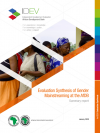Over the years, various policy frameworks and institutional mechanisms have guided the African Development Bank Group (AfDB or the Bank)’s efforts to promote gender equality in Africa. As the core approach, mainstreaming gender in its operations has intended to deal with the persistent factors that hinder women’s empowerment and the achievement of gender equality at regional and national levels.
Independent Development Evaluation (IDEV) carried out an Evaluation Synthesis on Gender Mainstreaming at the AfDB since the beginning of the Bank’s Gender Strategy (2014-2018). The purpose was to draw lessons for the AfDB’s new gender strategy under development, and to enrich the knowledge base about gender mainstreaming. The evaluation exercise examined the Bank’s gender mainstreaming approaches, mechanisms and results in light of institutional, regional and global priorities for Gender Equality and Women’s Empowerment in Africa. As part of the evaluation, a synthesis of evaluative evidence from comparator institutions was conducted.
Lessons
Key learning on enhancing gender mainstreaming includes:
- Building on existing strengths and comparative advantages, while applying a sharper scope, would help the AfDB to mitigate weaknesses and better leverage its mandate.
- The Bank can strategically leverage the processes in its development and business delivery model and align with regional and global priorities by visibly and strategically linking the Bank’s gender agenda to the Sustainable Development Goals. This would also enhance framing and optimal accountability at the regional member countries level.
- A clear senior management commitment to the gender agenda at the corporate and sectoral levels should be supported by an internal accountability system, adequate resourcing and visibility of the agenda. Continuous and consistent sensitization about the value-added to the AfDB of its corporate gender commitments and practices would enhance the sustainability of results from gender mainstreaming .
- All entry points for gender mainstreaming in the AfDB project cycle need to be strategically used for maximum impact. At entry, comments from the gender experts on the Readiness Reviews should be consistently considered and integrated for project approval.
- Marketing and internal/external use of Country Gender Profiles should be enhanced,.
- Resource mobilization efforts should be increased, including through formalized funding arrangements, such as the finalization of the Gender Equality Trust Fund.
- There is a need to strengthen and formalize the internal partnerships of the Gender, Women and Civil Society Department with the Safeguards, Climate Change, and Human Resource departments.
Points for consideration
The following points for consideration were suggested for the AfDB’s new gender strategy:
- A combined Gender Policy and Strategy would enable a clear and consistent understanding of gender mainstreaming.
- Mapping the pillars and interventions in the gender strategy to the Bank’s Ten-Year Strategy, its High 5 priorities and the Sustainable Development Goals, as well as internal corporate policies and processes, would enhance relevance and usefulness of the strategy for related complexes in the Bank.
- The new gender strategy should maintain the structure of the gender strategy (2014-2018), which includes both internal and external components, with a more streamlined and sharper focus. In line with the Bank’s processes, a clear, systematic approach to monitoring and evaluation of gender processes and results, and joint approaches to collecting gender data in specific sectors through operations, as reinforced by the Gender Marker System, is necessary.
- Consistent with the gender strategy (2014-2018), knowledge management should be more strategic and deliberate to facilitate effective learning, decision-making and communication of gender mainstreaming achievements, results and challenges inside and external to the AfDB.
- Consideration for lessons and recommendations should be accompanied by a focused consultation process among key departments to agree on the AfDB’s gender priorities. Co-development of the new gender strategy is critical, to increase internal and external buy-in.
Task Manager: Svetlana Negroustoueva – Principal Evaluation Officer


